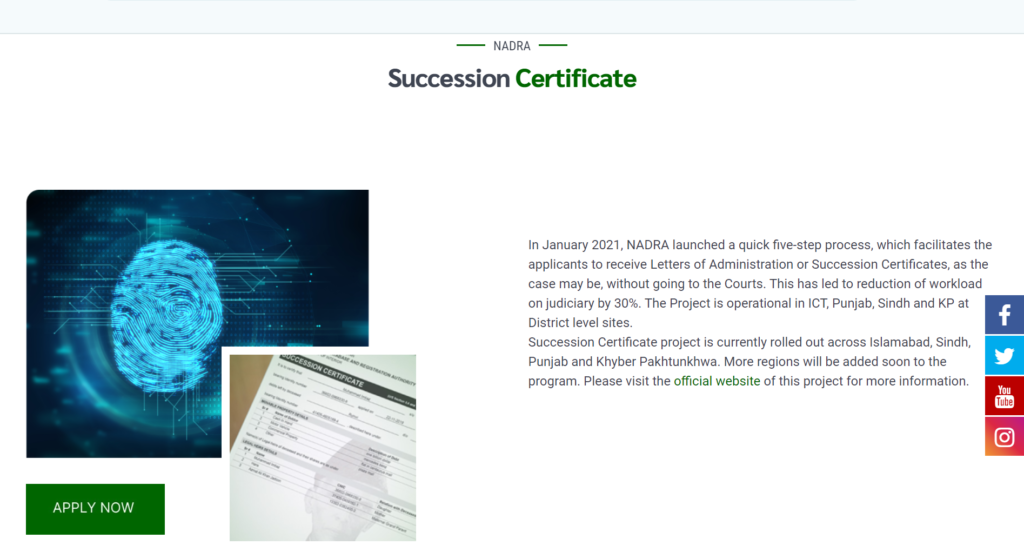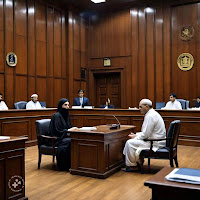Succession Certificate Through NADRA: A Step-by-Step Guide
NOTE: To Apply for Succession Certificate through Nadra Scroll to End:
In times of loss, dealing with legal formalities can be overwhelming. One such crucial task is obtaining a Succession Certificate. This document, issued by NADRA (National Database and Registration Authority), is essential for managing the inheritance of a deceased person’s estate. But what exactly is a Succession Certificate, and how can you obtain one through NADRA? This guide will walk you through the process in a simple, step-by-step manner.
Introduction
Losing a loved one is never easy, and the aftermath often involves dealing with various legal procedures. Among these, obtaining a Succession Certificate through NADRA stands out as a critical step for managing the deceased’s assets. This guide will simplify the process for you, ensuring you know exactly what to do.
What is a Succession Certificate?
A Succession Certificate is a legal document issued by a court to the legal heirs of a deceased person, certifying the legitimacy and authenticity of their claims to the deceased’s assets and debts. It is typically required for the transfer of movable assets like bank accounts, securities, debts, and other investments to the heirs.
Key Features of a Succession Certificate:
- Authority: A succession certificate grants the holder the authority to collect the debts and securities of the deceased.
- Legal Heir Recognition: It recognizes the holder as the legitimate heir to the deceased’s movable assets.
- Transfer of Assets: Banks, financial institutions, and other entities often require a succession certificate to transfer assets to the heirs.
- Debts and Securities: It is specifically used for the settlement of debts and securities of the deceased. For immovable property, other legal documents like a will or a legal heir certificate might be required.
Process of Obtaining a Succession Certificate:
- Application: The legal heir must file a petition in the appropriate court, usually where the deceased resided or where the assets are located.
- Details in Petition: The petition should include:
- The name and relationship of the petitioner to the deceased.
- The time, date, and place of death.
- The details of family or other relatives.
- The right of the petitioner.
- The list of debts and securities for which the certificate is sought.
- Court Notice: Upon filing the petition, the court issues a notice to all concerned parties and publishes it in a newspaper to invite objections, if any.
- Objections and Hearing: If no objections are raised within the stipulated time, the court proceeds. If objections are raised, a hearing is conducted to resolve the disputes.
- Grant of Certificate: After verifying the claim and the absence of any valid objections, the court issues the succession certificate to the petitioner.
Importance of a Succession Certificate:
- Legal Assurance: It provides legal assurance to financial institutions and debtors about the rightful claimant of the deceased’s assets.
- Smooth Transfer: It facilitates a smooth and hassle-free transfer of assets to the legal heirs.
- Debt Settlement: Helps in the settlement of debts and liabilities of the deceased.
Why Do You Need a Succession Certificate?
When a loved one passes away, managing their estate can be a complex process. One essential document that often comes into play is the succession certificate. This certificate is a crucial legal instrument that helps in the administration of the deceased’s assets and debts. Understanding why you need a succession certificate and how it benefits you can simplify the estate management process during a difficult time.
Who Can Apply for a Succession Certificate?
A succession certificate is a legal document issued by a court that authorizes the holder to manage the debts and securities of a deceased person. The process for obtaining a succession certificate varies by jurisdiction, but generally, the following individuals can apply for it:
- Legal Heirs: Immediate family members of the deceased, such as spouse, children, parents, and siblings.
- Nominees: Persons nominated by the deceased in their financial documents, such as bank accounts or investment accounts.
- Executors or Administrators: Individuals named in the will to administer the estate, if there is a valid will.
- Legal Representatives: Any person who represents the estate of the deceased, including legal guardians for minor heirs.
- Creditors: In some jurisdictions, creditors of the deceased may apply for a succession certificate to recover the debts owed to them.
The application process typically involves submitting a petition to the relevant court, providing details of the deceased, the petitioner, and the assets to be covered by the certificate. The court may require notices to be published to allow objections from other interested parties before issuing the certificate.
Documents Required for a Succession Certificate
To apply for a Succession Certificate, you’ll need the following documents:
- Death certificate of the deceased
- CNIC (Computerized National Identity Card) of the deceased
- CNIC of the applicant
- List of legal heirs
- Proof of relationship with the deceased
- Details of the deceased’s assets
Having these documents ready will streamline the application process and prevent unnecessary delays.
Step-by-Step Guide to Obtaining a Succession Certificate
Now, let’s dive into the detailed steps to obtain a Succession Certificate through NADRA.

Filing the Application
- Visit the NADRA Office: Head to your nearest NADRA office or visit their online portal.
- Fill Out the Application Form: Provide all required information accurately.
- Submit the Documents: Attach the necessary documents mentioned above.
- Pay the Fee: There is a processing fee that needs to be paid at the time of application submission.

Verification Process
Once your application is submitted, NADRA will initiate a verification process. This includes:
- Verification of Documents: NADRA will check the authenticity of the documents provided.
- Public Notice: A public notice will be issued to invite any objections to the issuance of the certificate.
- Hearing: In some cases, a hearing might be conducted to resolve any disputes or objections.
Issuance of the Certificate
After successful verification, NADRA will issue the Succession Certificate. This certificate will include:
- Details of the deceased
- List of legal heirs
- Description of the assets
The certificate will be delivered to the applicant, who can then use it to claim the inheritance.
Fees and Charges
The cost of obtaining a Succession Certificate through NADRA includes:
- Application Fee: This varies depending on the value of the estate.
- Verification Fee: Additional charges for document verification.
- Miscellaneous Charges: Any other expenses that might occur during the process.
It’s advisable to check the latest fee structure on NADRA’s official website or inquire at the office.
Note: To Pay Fee Online for Different Services Please Check This link
Common Challenges and How to Overcome Them
Applying for a Succession Certificate can sometimes be challenging. Here are some common issues and tips to overcome them:
- Incomplete Documents: Ensure all required documents are complete and accurate.
- Objections from Other Heirs: Try to resolve any disputes amicably before applying.
- Delays in Processing: Follow up regularly with NADRA to avoid unnecessary delays.
By being proactive and prepared, you can navigate these challenges effectively.
Apply Succession Certificate
Conclusion
Obtaining a Succession Certificate through NADRA might seem daunting, but with the right information and preparation, it becomes manageable. This guide aims to simplify the process, ensuring you can focus on what truly matters during a difficult time. Remember, each step brings you closer to securing your rightful inheritance.
FAQs
1. What is the validity of a Succession Certificate?
A Succession Certificate remains valid indefinitely unless revoked by a competent court.
2. Can I apply for a Succession Certificate online?
Yes, NADRA offers an online application process for obtaining a Succession Certificate.
3. What happens if there are objections during the verification process?
If objections are raised, NADRA may conduct a hearing to resolve disputes before issuing the certificate.
4. How long does it take to get a Succession Certificate?
The processing time can vary but typically takes a few weeks, depending on the complexity of the case.
5. Is a Succession Certificate required for immovable property?
No, a Succession Certificate is only required for movable property. For immovable property, other legal documents may be necessary.
By following this guide, you’ll be well-equipped to handle the process of obtaining a Succession Certificate through NADRA, ensuring a smoother transition during challenging times.

